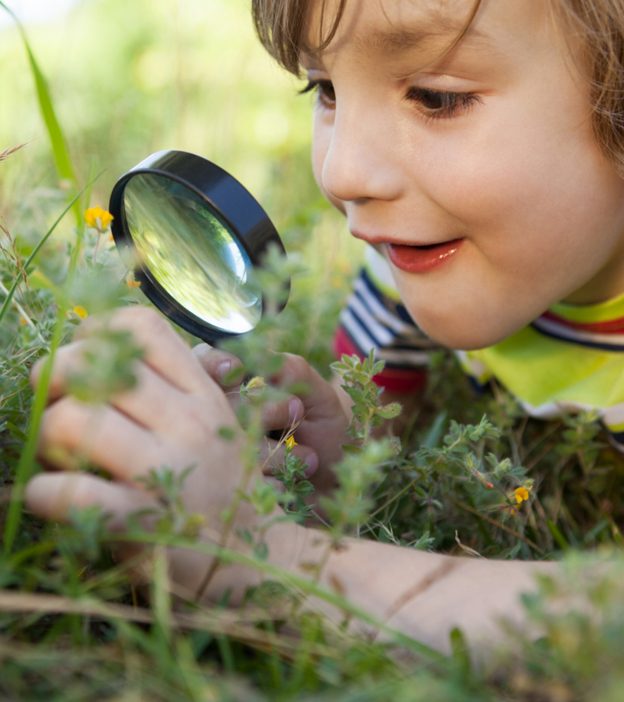
image: iStock
Curiosity in children is a common trait. The way their eyes sparkle when your show or tell them something new is a treat to watch. And while their constant need to know every answer might irk you at times, curiosity works wonders for the little ones.
A curious child will always constantly learn, be creative, think outside the box and unravel something new, even in ordinary things. So, if your child asks you many questions, know that they have started thinking, and their cognitive development has also started taking its course. Read on to know more about the benefits of curiosity in children and how to develop their curiosity.
How Beneficial Is Curiosity To A Child?
While curiosity might have killed the cat, it offers several benefits for young minds (1) (2).
- Curiosity can make a child’s mind more active. It makes your child think more and ask questions.
- It makes children more observant and more receptive to information.
- When a child is curious, it makes them learn more about different things around them. They try to come up with different possibilities and think outside the box.
- Moreover, it makes a child more excited about the world around them. They look to learn more and find joy in the littlest of things around them.
Tips To Develop Curiosity In Children
Image: Shutterstock
Here’s how you can awaken your child’s curiosity and keep it going (1) (2) (3) (4) (5):
1. Use the phrase “I wonder…”
While conversing with your child, try to use the phrase “I wonder…” often. For instance, you could say, “I wonder why the sun goes down each evening?” or “I wonder why stars shine bright?” This will get them thinking and make them more curious.
2. Don’t discourage
Your child’s curiosity will lead them to engage with things they love. Instead of dissuading your child from exploring hobbies or other interests, do the opposite. Encourage them to learn with an open mind. At the same time, don’t fret over their never-ending questions. Instead, answer their questions patiently and with a smile.
3. Follow your child’s lead
Yes, you read that right! While most people are keen to make their children follow in their footsteps, it can be beneficial to do the reverse at times. Let your child take the lead, and look at things from their perspective. Engage with your child as they set out to explore. This will help the young ones feel supported.
4. Make them observant
Image: Shutterstock
Make your child observant by pointing out things and posing questions. You could even play a game. For instance, point at green cacti, and then ask your child to find things of the same color. This will make them more observant of their surroundings and notice things they are not usually interested in or don’t pay attention to.
 Quick tip
Quick tip5. Allow independent play
It may worry you if your child finds it challenging to come up with a solution to a problem. However, do not rush in and solve it for them. It is essential to supervise what the little one is up to; however, don’t nudge, guide, or tell them how it’s done. Allow independent play to build more curiosity and instill a sense of self-reliance.
6. Let them make mistakes
Make room for mistakes. Don’t criticize your child for making a mistake. Instead, laud them for trying and encourage them to learn from it. By negating the fear of being yelled at for a mistake, you automatically encourage your child to become more curious.
7. Give them the freedom to explore
Your child will lean towards things that fancy them. Instead of forcing something on them, allow them to explore. While it is a common tendency of parents to make children do what’s ’right,’ it may do them more harm than good. Being too strict or too careful could hamper the natural creativity in children. Allow children to let loose and explore what they want.
8. Create a conducive environment
A child is always observing, exploring, and absorbing. Expose the little one to interesting toys, pictures, books, motion clips, etc. Build a stimulating space for them to explore. This will keep them positively hooked and awaken their curiosity.
9. Allow time for open-ended activities
Your child might play with a stray piece of paper more joyfully than with a plain toy. Similarly, they might be more interested in a LEGO set as opposed to a stuffed toy. Engage them in open-ended activities, and let them experiment and use their imagination to come up with different things.
10. Answer questions clearly
Image: Shutterstock
Children often come up with lots of questions. And while adults try to give them in-depth answers, it may hardly be called for. Address their questions without complications. Don’t ignore or overwhelm them with too much information, or you’d kill the fun in learning.
 Point to consider
Point to consider11. Include challenges into their routines
While it is essential to dumb down things for your child, don’t overdo it. Too simple could also mean too boring. Include challenges into your child’s routine to keep them engaged. For instance, buy them intricate LEGO sets or introduce some brain games.
12. Generate interest in the world around them
While it is easy to ignore the seemingly mundane things in life, sparking your child’s curiosity in the little things in life is an excellent way to develop children’s curiosity. Allow children to indulge more deeply with the things in their surroundings. Take them for a walk and let them wander bare feet. Allow them to touch, feel, and hear different things.
13. Provide scope for curiosity to grow
While it is crucial to guide your child on the learning path, don’t teach them everything that there is to know. The key lies in striking a balance. Give them a little leeway to explore and learn certain things independently. Enable, don’t impart, and always leave room for curiosity to grow.
14. Stimulate children with open-ended questions
Instead of asking, “Is that color red?” ask “Which color could that be?” or even better, ask “How many colors are out there?” before getting to the main question. Open-ended questions aid thinking.
15. Encourage them to make their own choices
Do not brush off your child’s choices as illogical. Allow them to experience and dabble with them. This way, they can see something from a new perspective and learn on their own accord.
17. Help them feel confident
Always build up your child’s morale. Make them feel like they can reach their goals despite the odds, and make them fearless about failure – they’d willingly take more risks and gain more knowledge in the process.
18. Travel with them
Image: Shutterstock
Traveling is one of the most exciting ways to gather knowledge. By exposing your child to traveling at an early age, you could broaden their horizons and make them more curious about new cultures.
19. Surprise them often
Give your child a mental ride when they least expect it! Arrange an impromptu luncheon, take them to an art class, or set out on a walk in a new neighborhood. By taking them by surprise, you stimulate their mind in a positive and fun way.
20. See learning as something fun
When you encourage your child to learn through play, it makes them more involved. If your child finds learning a burden, they will never feel inspired to dig deeper. When there’s some fun involved, they’ll be excited and get wholly involved in the process.
 Quick tip
Quick tip21. Encourage reading
As books are considered a source of knowledge, you can also read with them, knowledge is a precursor to curiosity.
22. Ask them questions
Take help. For example, you can say, “Kid, can you help me with this? I don’t know this. Do you know this?” Being a kid with a kid is beneficial for their holistic development.
Frequently Asked Questions
1. What are the signs of a curious child?
You can easily identify a curious child since they pose many questions. They are generally engaged in several topics and actively seek to find answers.
2. How does curiosity enhance learning?
Curiosity makes a child’s brain more interested in learning. It also increases their feel-good hormone levels and makes the learning experience rewarding. This natural drive to learn also improves their memory power and helps them retain information well (6).
Curiosity in children encourages them to explore new areas of knowledge. Curious children love to ask questions and try to find answers to them. Curiosity helps them familiarise themselves with the unfamiliar and utilize their brains to the maximum capacity. As a result, curious children are confident, intelligent, problem solvers, and more receptive to information. While answering your child’s questions all the time may get tiring, encourage them to ask all the questions they can think of and feed their brain with the best fodder of knowledge.
Infographic: Enhancing Curiosity In Children
Working on enhancing curiosity in children will ensure they grow into happier, more intelligent, and more resilient adults. This infographic is a handy guide that provides you with some fun activity ideas to enhance curiosity in your children. Illustration: Momjunction Design Team
Get high-quality PDF version by clicking below.
Download Infographic
Key Pointers
- Curious children are more observant and responsive to knowledge.
- Engaging in and supporting your child’s exploration can help to foster curiosity.
- You may encourage your child to be more observant by pointing out things and asking questions.
- Incorporating challenges into your child’s daily routine, such as cognitive games, may also be beneficial.
References:
- Developing curiosity in the young child’s brain.
https://www.canr.msu.edu/news/developing_curiosity_in_the_young_childs_brain - The benefits of being curious.
https://www.doinggoodtogether.org/dgt-newsletter/the-benefits-of-being-curious - Nurturing Your Young Child’s Curiosity.
https://www.zerotothree.org/resources/3505-nurturing-your-young-child-s-curiosity - 13 Ways To Encourage Curiosity In Children That Most Parents Ignore.
https://www.lifehack.org/444453/13-ways-to-encourage-curiosity-in-children-that-most-parents-ignore - 24 Ways To Develop Curiosity.
https://www.brainbytes.org/blog/24-ways-develop-curiosity/ - Why Curiosity Enhances Learning.
https://www.edutopia.org/blog/why-curiosity-enhances-learning-marianne-stenger





















